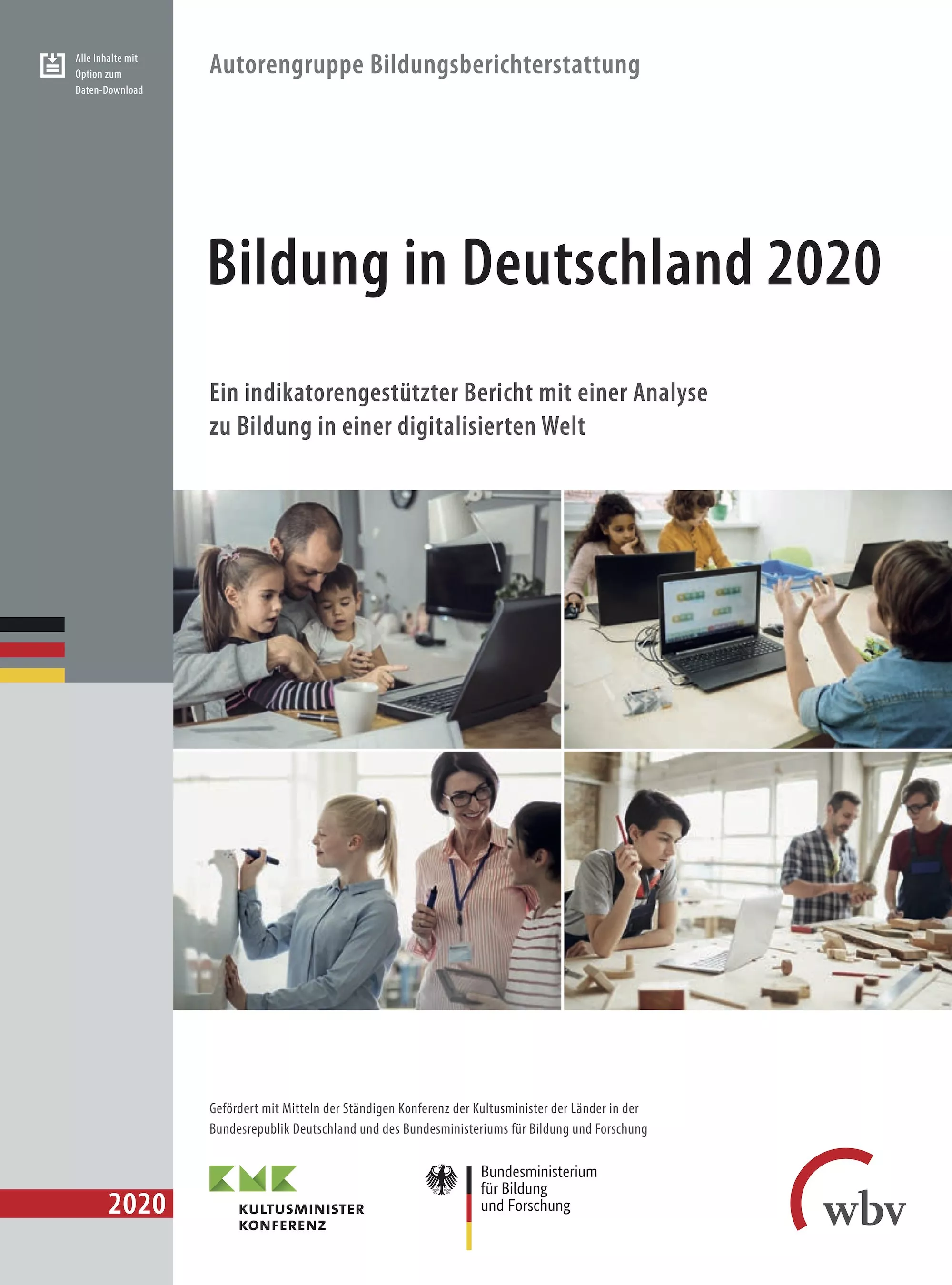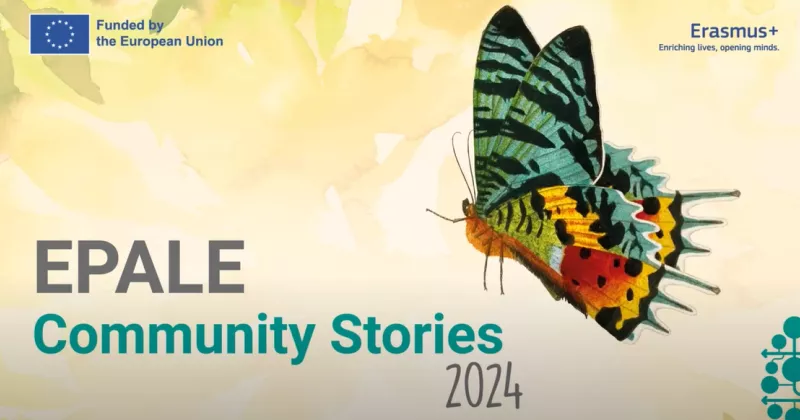Trends and perspectives for continuing education in the National Report on Education 2020
Reading time approximately 5 minutes - Read, like, comment!
This article has originally been published in German by Jonathan Kohl and Ina Rüber.
.

In 2020, for the first time, the German Institute for Adult Education (DIE) was among the contributors to the report on national education, and was responsible for the chapter “Continuing education and learning for adults”. The chapter’s comprehensive new approach aims to do justice to the quaternary education sector in its entirety.
I teach or manage in continuing education – What does the national report on education offer me?
The report is aimed at a broad target group: Stakeholders in educational policy and administration as well as the general public. Drawing on representative findings and figures from the field of continuing education, the 24-page report aims to benefit all target groups. Teachers or managers may have trouble finding aspects which are related to their specific fields. However, the generally highly aggregated information can still be of practical use, for example in obtaining a broad overview of continuing education and seeing one’s own activities, target groups and participants, institution profile and education provision, as well as development strategies, in a broader context. The report also highlights key challenges which academia and policy-makers believe the education sector is facing. This can be beneficial when it comes to developing future programmes and education provision and, in the medium and long term, can help with acquisitions and external funding.
What follows are some of the central findings for the quaternary education sector from the 2020 report on education. The full report (in German) is available free of charge here:
Increasing participation – increasing significance of continuing vocational education
While there are no major changes concerning participation rates in formal education and informal learning activities among adults, participation in non-formal educational activities has risen to 52% of all 18 to 69 year olds, its highest level to date . The increase is primarily due to in-company training, which remains by far the largest segment in continuing education. Accordingly, the majority of continuing education activities are carried out by company-based organisations. The majority of continuing education hours are accounted for by commercial organisations, which alongside state and community-based organisations cater, above all, to the segments of individual continuing vocational and non-vocational education.
Opportunities for participation among adults continue to be unevenly distributed. Employees of small companies or in sectors where continuing education rarely features (e.g. gastronomy and accommodation), as well as part-time staff and employees whose tasks are considered “simple”, are less likely to be offered continuing education opportunities by their employer. In 2018, a total of 54% of all companies supported continuing education by granting leave or covering costs. Particularly high levels of support were to be found in the sectors education and teaching (87%), health and social work (81%) and public administration (85%). As part of Germany’s National Continuing Education Strategy (NWS) initiated by the Federal Ministry of Labour and Social Affairs (BMAS) and the Federal Ministry of Education and Research (BMBF), a major series of measures were approved in 2019, aimed in particular at strengthening continuing education in medium-sized companies. The strategy was launched not a moment too soon. Due to the Coronavirus pandemic and the associated economic consequences, smaller companies are likely to find being active in the area of continuing education even more difficult in the future. The effectiveness of the measures remains to be seen.
Regional disparities deserve particular attention despite and because of digitalisation and the coronavirus pandemic
Despite increasing digitalisation in all areas of life, including continuing education, face-to-face learning still dominates continuing education and adult learning in general. Digital media frequently supplement face-to-face learning, but seldom replace it. The regional accessibility of continuing education providers thus remains a key factor in adult learning. Because market logic encourages commercial and company-based organisations to concentrate on densely populated and economically powerful regions, state and community-based providers can help to offset the discrepancy. Although both types of education providers have institutions throughout Germany, there are major regional differences. As a rule, federal states in the east of Germany tend to have fewer institutions, as well as lower rates of participation. As a result of the Coronavirus, what was previously the exception – online formats instead of face-to-face formats – has now become the rule. People in rural areas with poor internet connections, as well as people in urban areas with low data transfer rates or data volume, are categorically excluded from digital offers. Likewise, people who lack digital competencies or have little desire to engage with digital media will not participate in digital continuing education.
Continuing education in the spotlight: Quality management, participant satisfaction and many positive effects
On the whole, participants in non-formal educational activities rate their experiences and what they have learned very positively – with some minor differences. Participants in non-vocational continuing education tend to be particularly satisfied, even though they do not envision any especially high direct and future use for what they have learned. This generally positive assessment can be seen as evidence of the high quality of the teaching and learning process in continuing education. Education providers go to great lengths to ensure quality, even if these efforts may in part be externally motivated. In many cases, the implementation of quality management systems (QMS) is a legal requirement and has already been completed in 80% of all institutions.
High levels of satisfaction with the educational activity are also reported in cases where the direct usefulness of the material learned is judged less positively. This highlights additional benefits of continuing education which can lead to a positive effect on both the individual and society. Such benefits include greater involvement in the community and greater employment opportunities and job security. Participants in state-funded continuing education linked to the German social security system also have better employment opportunities, although in this instance there are significant differences among individual occupations which may well be exacerbated by the Coronavirus pandemic. Negative developments are to be expected, in particular, in occupations which cannot be practised due to restrictions imposed to bring the pandemic under control and in which, even before the pandemic, continuing education less frequently resulted in work (e.g. in the areas of administration, camera and sound technology, acting, dance and movement-based art as well as teachers at non-school-based educational institutions).
Continuing education helps to integrate migrants and refugees
One of the main tools that the Federal Government employs to promote integration are integration courses. These courses aim to teach not just the German language but also history, law, culture and fundamental values. Two tests are used to measure success. The aim is for participants to achieve at least B1 level on the language test and to pass the “Leben in Deutschland” (“Life in Germany”) test. However, since 2016, fewer participants in integration courses have been attaining B1 level. The proportion of people passing the orientation courses is also falling. The reason for the lower success rate is partly due to the difficult preconditions for learning which the participants bring with them, but also the teaching staff’s need for support, given that they face major challenges with respect to cultural differences. Integration courses are not the only important educational activities for migrants when they arrive in Germany. This is made clear by the growing number of participants with a migration background in formal educational activities which help them to acquire new qualifications or obtain recognition for qualifications already acquired abroad.
The report on education is part of an ongoing project
For the German Institute for Adult Education this year's report focused on the new approach to continuing education. The conceptual work will be continued in the next edition in 2022. One key question in this regard is how the needs of stakeholders in educational policy and practice can be better and more systematically integrated into reports on education. The key requirement is dialogue. We are starting that dialogue here with you! If you have questions, comments or suggestions regarding the national report on education, the chapter on continuing education and its findings, then please leave a comment or contact us.
Email: kohl@die-bonn.de
About the authors
Jonathan Kohl and Ina Rüber are research associates in the “System and Politics” Department at the German Institute for Adult Education (DIE) – Leibniz Centre for Lifelong Learning.
Dr. Sarah Widany is Head of the Department.
You might also be interested in:
EPALE Theme: National Policies and Funding
wbmonitor: Theorie-Praxis-Wissenstransfer im Fokus [DE]
Handreichung: Wie erstellt man einen kommunalen Bildungsbericht? [DE]






These results are very interesting for future Erasmus projects